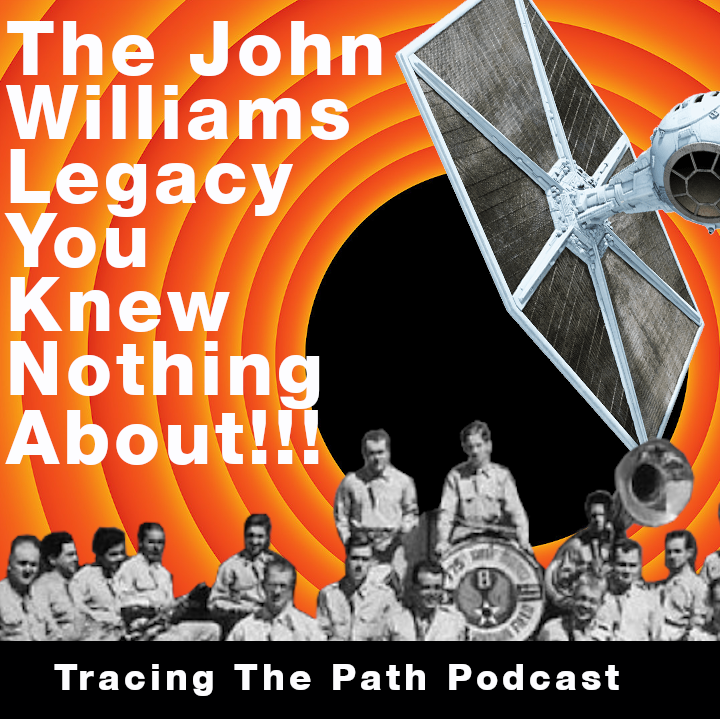
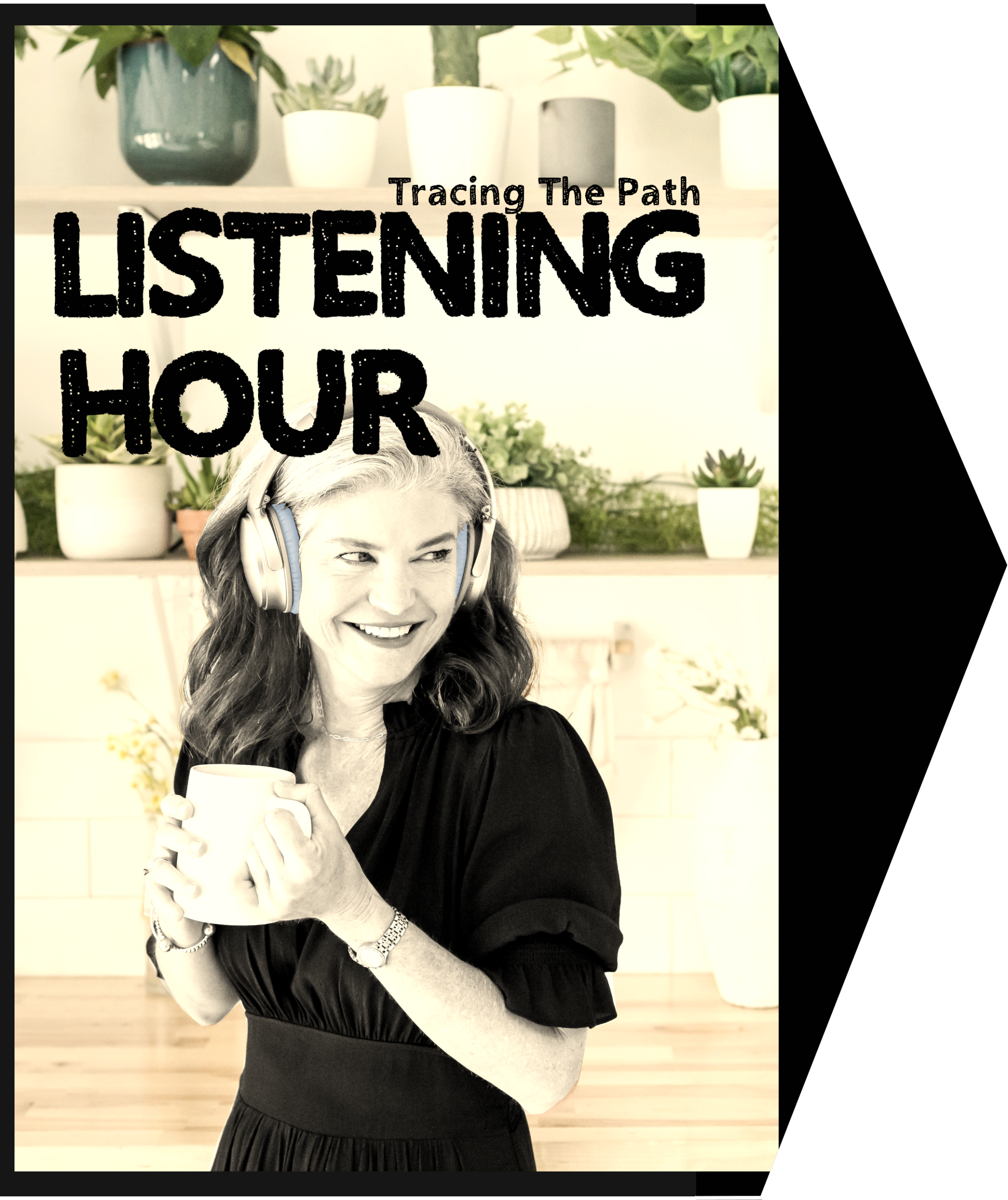
Audio Hour:
If you run an activity group, classroom or “audio book club”, click here for more information on using Tracing The Path.
Throughout the episodes, every tune is somehow related to the topic. In the Twinkies episode, for instance, the discussion of the Brooklyn Tip-Tops Baseball team concludes with “Take Me Out To the Ballgame”.
How many do you recognize? And harder, how many can you name?
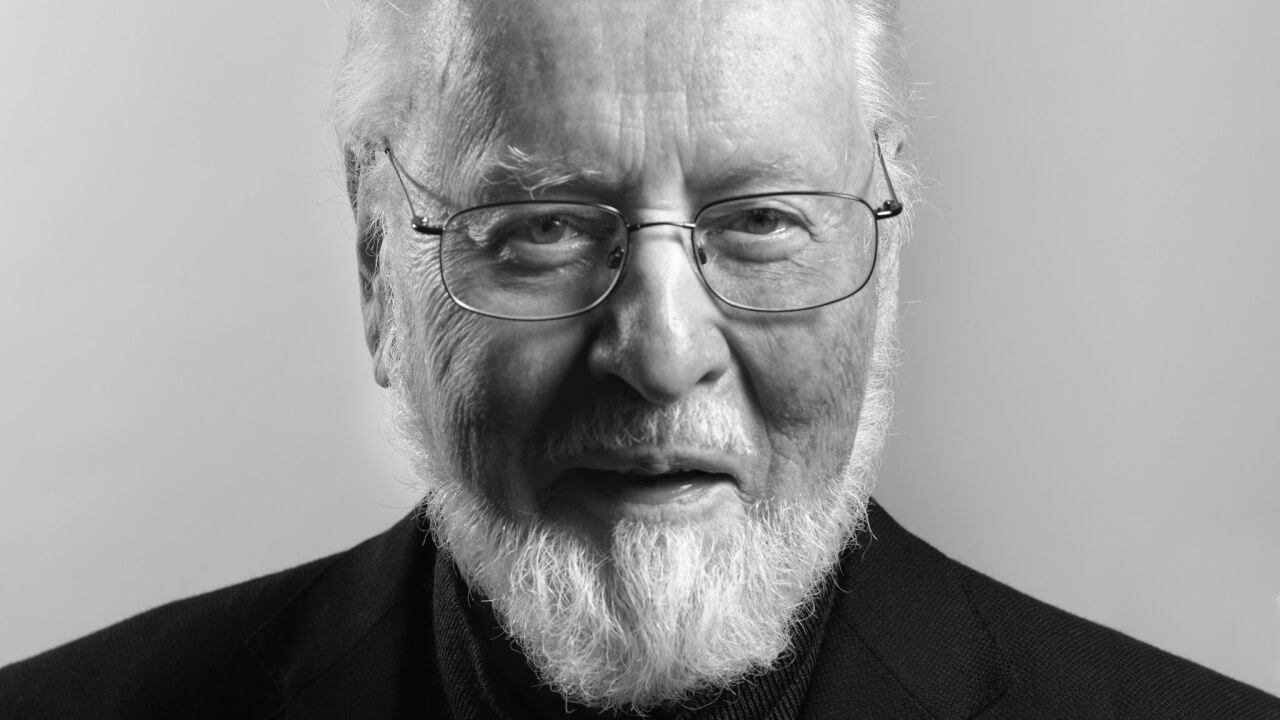
The John Williams Legacy You Knew Nothing About
If you leave a stock of celery in red tinted water for seven days, it becomes clear that the entire stock absorbed the tint. When you steep a musical family in 120 years of musical history, you produce the most award winning family of all time. And only one family can connect the dots between Glenn Miller, Frank Sinatra, Alfred Hitchcock, Gilligan’s Island, E.T., the Olympics, Saved By the Bell, Harrison Ford, Tears for Fears, and Donald Duck.
Mr. Williams, Sir.
Johnny Williams was born in 1905 in Watertown, Massachusetts, to a cabinet maker and gardener. It’s not known what turned Johnny into a musician, but it is known that he loved the drums. His father was also an expert marksman, who had actually constructed a shooting range in the basement of his Queens, New York City home.
Maybe Johnny played the drums to help mask that noise.
Academically, he was more academically inclined and pursued architecture at Columbia University. But graduating in 1931 during the Great Depression, jobs were hard to come by. So he leveraged his musical talent to become a percussionist with the CBS Radio Orchestra.
Radio was America’s pastime in the 30s, so the orchestra played for programs like Orson Wells’s Mercury Theater, Bob Hope Specials, Bing Crosby, Benny Goodman and Tom Dorsey. They were even commissioned to play music for the movies.
But an orchestra job wasn’t enough money for most band members, so they found other gigs. Johnny joined up with his friend Harry Wernow and formed the Raymond Scott Quintet. Since Harry’s brother Mark was the CBS radio orchestra conductor, he chose the name Raymond Scott to put a little distance from his brother.
In 1936, the Raymond Scott Quintet, with Johnny as pianist, got their big break and started playing on the CBS radio program Saturday Night Swing Club. Their live performance of Twilight and Turkey was an overnight sensation. Duke Ellington’s manager, Irving Mills, signed them and started producing albums.
At the same time, Harry’s brother Mark, the CBS Orchestra conductor, started a program called Your Hit Parade, which he had the Raymond Scott content play the music for. Their success had them playing music for movies as well. Ethel Merman, Tony Martin, Eddie Cantor, Duke Ellington, and Bill Bojangles Robinson, all were blessed by the Raymond’s got quintet playing in their movies.
And they played their most favorite tune, The Toy Trumpet, in Rebecca of Sunnybrook Farm with Shirley Temple. Harry sold the Raymond Scott Quintet music to Warner Brothers a few years later. The musical director of Warner Brothers at the time was Carl Stalling.
Carl took to his music immediately and for the next 20 years the Raymond Scott Quintets music would show up about 140 times in Warner Brothers cartoons starring Bugs Bunny, Daffy Duck and Porky Pick.
For Johnny the Raymond Scott quintet was only half of his life. The other half was the CBS radio orchestra job, not to mention getting married and having kids.
John Williams . . the son
His eldest son John recalled hearing his dad play for the first time. He said it was a life-changing moment. He knew immediately he was born to play music. And at seven years old, he started learning piano, trumpet, trombone, and a clarinet.
Johnny’s other sons, Jerry and Don, took up drums like their father. Mark Wornow’s program, Your Hit Parade, really took off. Alan Learner, before Learner and Lowe, was writing the script. And in 1948, they signed Doris Day and Frank Sinatra as hosts. But with that came moving to Los Angeles.
Little John Williams was 16 when they moved, and his music interest was more than piqued. His music teacher at North Hollywood High had studied orchestration and helped John write, play, and arrange music for the school band. He actually wrote his first piano sonata before he was 19.
After high school, John attended UCLA under the amazing direction of Robert Van Epps, who wrote music for MGM. And hoping to become a concert pianist, he hired Mario Castelnuovo Tedesco as a private tutor.
Castelnuovo Tedescu was a Jewish immigrant from Italy who had already composed an opera, cello concertos, and over 100 compositions for guitar. And he had another student, a promising young man named Henry Mancini, who worked as the pianist for the Glen Miller Orchestra.
Unfortunately, John’s schooling was cut short with the Korean War in the draft. Henry Mancini, who had already served in the Army Band, helped John navigate to a music assignment after he was drafted. Even during his enlistment, he served as an airman playing piano, conducting and arranging for the Air Force Band in Riverside, California.
And then after his discharge, John moved back to New York City to attend Julliard. This time, his teacher was Miss Rosina Levine. Julliard was so full of talent, a couple of the other students, Van Claiborne and John Browning actually intimidated John, and made him think that perhaps he would be better composing than playing.
But the composing jobs were back in Hollywood, where he’d made all his contacts in school and through his dad. So he moved back to Hollywood, in addition to be a pianist for 20th Century Fox. That gave him access to some higher profile jobs, and being promoted to staff arranger, he started getting noticed.
The Hollywood Years
Some Like it Hot, To Kill a Mockingbird, West Side Story, and he even teamed up with Henry Mancini to write Peter Gunn, all decorated his resume. (The piano part of Peter Gunn is John Williams).
In 1956 he was promoted again.
He got to start working with Alfred Newman, a giant in the music industry. Newman had already scored 200 films including Wuthering Heights, All About Eve and How the West Was Won. That year Alfred won the Oscar for The King and I. John he also worked with Frank Waxman, a composition genius. John had received an Oscar for Sunset Boulevard, A Place in the Sun, and was the composer for Alfred Hitchcock’s Rebecca.
Bernard Harmon was another colleague John got to work with. Bernard scored Hitchcock’s Psycho and Vertigo among others. Also, Citizen Kane, The Day the Earth Stood Still, Taxi Driver, and many more.
And if that’s not enough, John also played in a jazz band with Tex Beneke, who was a member of the Glenn Miller Orchestra, Jack Spurling, a member of Bob Hope’s Orchestra, and Bob Bain, who was in Tommy Dorsey’s Orchestra.
There comes a time when the red tinted water has been absorbed all the way to the top, and no more can be absorbed. That is how John Williams must have felt in 1960.
It was time to stop absorbing and start composing greatness. For the next 30 years John Williams would pour out more of his heart and soul than he’d ever absorbed, and unlike his father, his contribution would not be playing an instrument, but composing the music.
His first job’s composing of note are songs for the show’s Wagon Train, Lost in Space and Gilligan’s island. And then the train really started rolling. Steven Spielberg saw something in him and asked if he’d score Sugarland Express, his first movie. And then a year later, Jaws. The Jaws theme became so popular, it is now synonymous with sharks. And do you know what that two-note chord of the Jaws theme song is? According to John Williams, it represents the opening and closing of the mouth of the shark.
Beyond composing, Frankie Lane asked him to do the arrangement for his last four albums, including songs like Rawhide, Luck Be a Lady, Tumbling Tumbleweed and North to Alaska.
Star Wars
Spielberg introduced John to George Lucas, where he wrote Star Wars, which the American Film Institute has labeled the greatest movie score of all time. And it didn’t stop there.
The Olympic Games theme, NBC Nightly News theme, Superman, Indiana Jones, Harry Potter, Jurassic Park, Fidler on the Roof, Close Encounters, Saving Private Ryan, Schindler’s List, and the list goes on and on.
Alongside John was his wife, Barbara Ruick, a graduate of North Hollywood High School as well. But after high school, she pursued acting and singing. She was actually part of the original Dragnet Radio show, and recorded songs off of Gershwin’s musical, OKlahoma. She was also in the film version of Carousel and a regular on the show, Dobie Gillis.
She and John had three children, Joseph Mark and Jennifer. In 1980, John’s career took a turn beyond composition. Now in his life, he felt compelled to teach beyond composing. And thus, became the 19th conductor of the Boston Pops, following Arthur Fiedler.
During his time as conductor, he would not only score movies, but wrote concert pieces and full concertos. He was closing the gap on doing everything a musician could do. And in William’s family tradition, his musical talent was being passed on to his children.
Joseph, the youngest, was making a name for himself. His music credits included Space Camp, Body Count, Save the Night, Magic Mike, Goonies, Lion King, Save by the Bell, and he wrote a hit song “Bootywork” performed by T. Payne, featured in the movie Pitch Perfect. But he is most well known as the lead singer of Toto, the 1980s band who had their hit song, Africa.
His other son, Mark, went to Berkeley College of Music and became a world-class drummer like his grandfather, Johnny. His musical credits included, “Jaws 2,” “Life Goes On,” “Medicine Woman,” and he played for Tina Turner, Cher, Air Supply and Don Henley.
And today, Mark’s son Lionel, who’s Johnny’s great grandson and John’s grandson, has a neo-psychodelic band called Vinyl Williams. He and his friend TJ Patreca have achieved some YouTube success and have worked with Tears For Fears, and Good Charlotte.
The legacy of the Williams family began in 1905 and continues today. John Williams is currently the most awarded person on the planet. Of his 51 Oscar nominations, he won five times. Of his six Emmy nominations, he’s won three times. Of his 25 Golden Globe nominations, he’s won four time. And of his 67 Grammy nominations, he’s won 23 times and to top it off, he earned himself seven British Film Academy Awards.
The only accolade John Williams doesn’t have musically is the highest grossing album of all time. That honor goes to Michael Jackson for Thriller. But Michael Jackson didn’t have a band, so he hired one to play the music for that album. And who did he hire?
No, no, other than the band famous for their 1980s song Africa, “Toto.” It is easy to see in the legacy of the Williams family that the term “job” could be replaced with love, which reminds me of a quote by Howard Thurman. “Don’t ask yourself what the world needs. Ask yourself what makes you come alive and do that because what the world needs is people who come alive.”
Welcome to tracing the path with Dan R Morris.
CUTTING ROOM FLOOR
To hear all the stories that hit the cutting room floor, you have to listen to the episode.
ABOUT THE SHOW
Let us tell you the story of the 20th Century, by tracing each event back to the original decisions that shaped it. You’ll quickly find out that everybody and everything is connected. If you thought you understood the 20th Century, you’re in for a treat.
Tracing the Path is inspired by storytellers like Paul Harvey, Charles Kuralt, and Andy Rooney.
INTERCONNECTED EPISODES
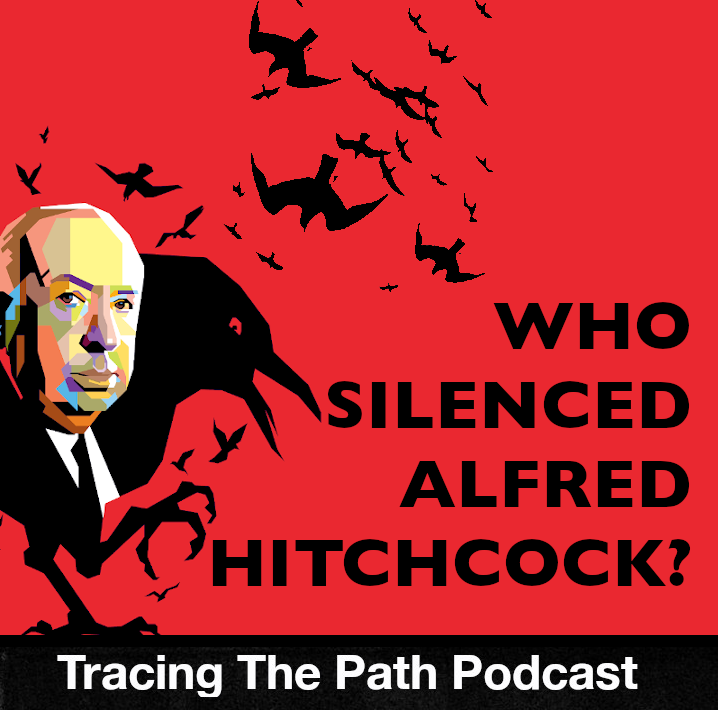 |
Who silenced Alfred Hitchcock? There can be two distinct meanings to the word Silenced. |
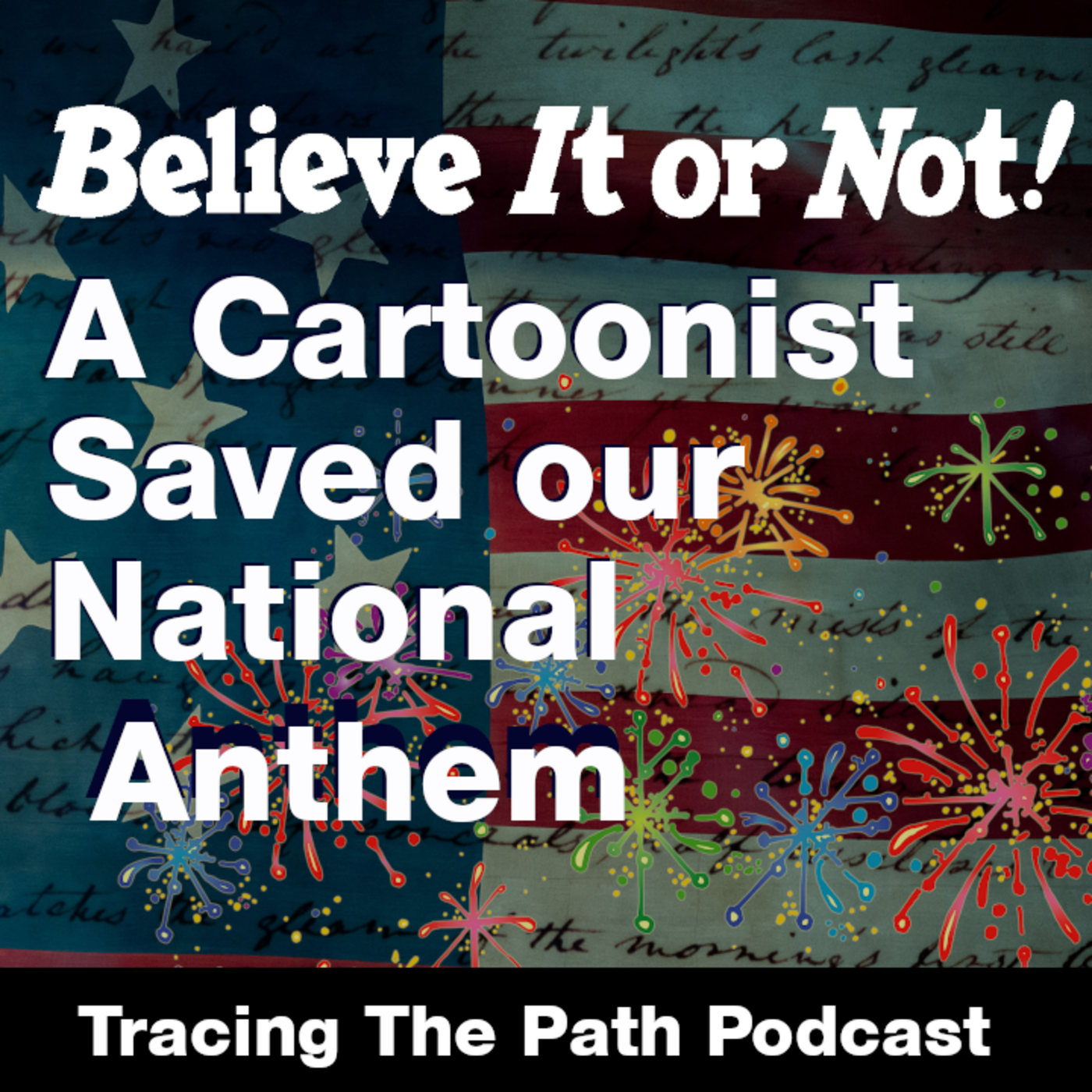 |
Believe it or Not? A cartoonist saved our national anthem. And not just a cartoonist, an American Military March composer as well. |
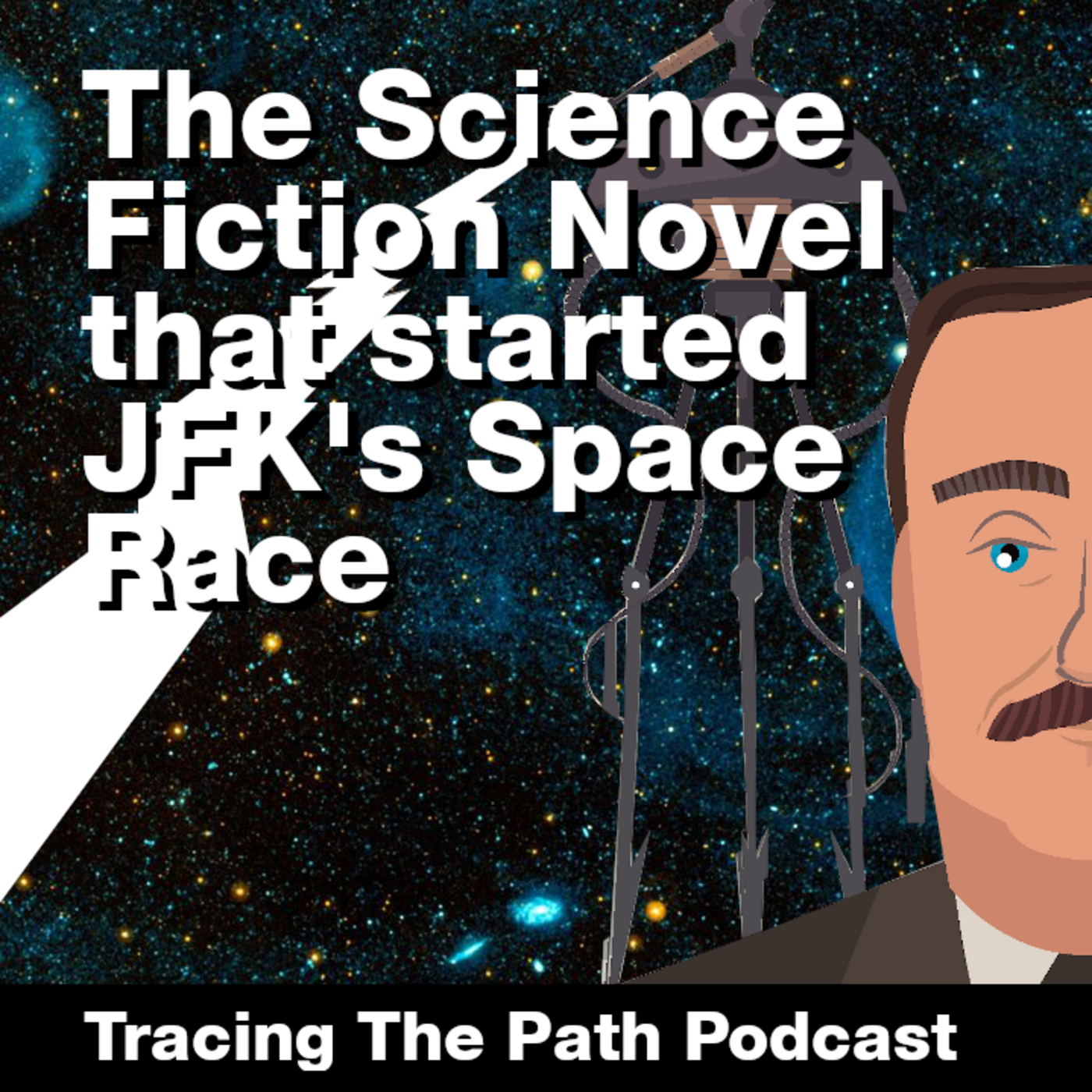 |
Who Started the Outer Space Race? Elon Musk isn’t the first person to have his eyes set on Mars. |
SEE THE BIBLIOGRAPHY
SUBSCRIBE AND LISTEN (FOR FREE!)
RATINGS & REVIEWS
If you enjoy this podcast, please give it a rating and review.Positive ratings and reviews help bring Tracing The Path to the attention of other history lovers who may not be aware of our show.



